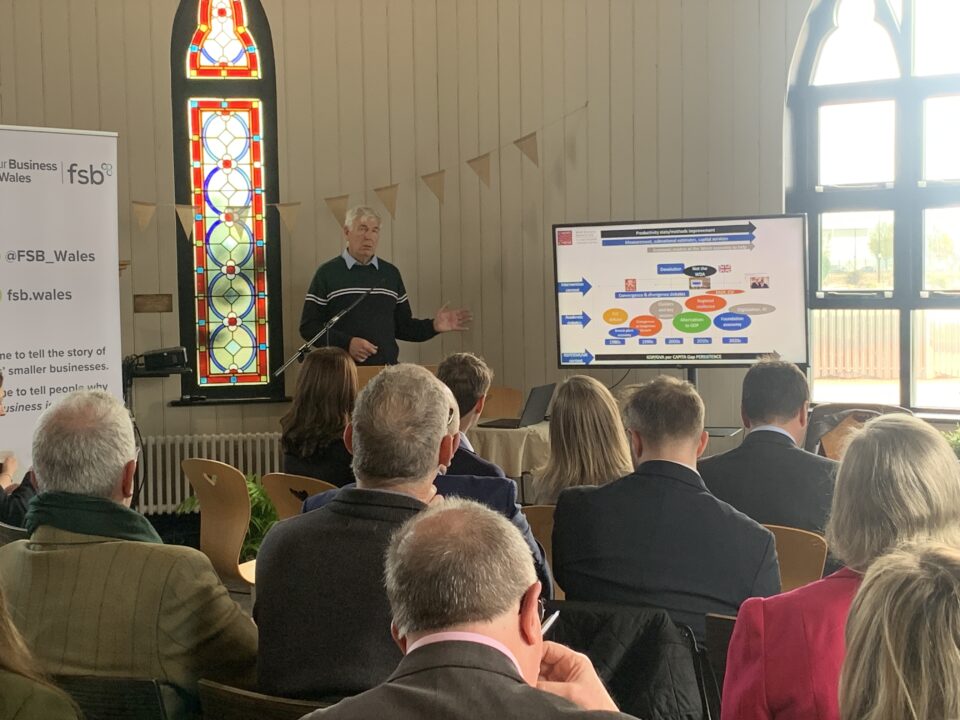Demystifying productivity for small business in Wales
Professor Max Munday, an academic from Cardiff Business School and a member of the Wales Productivity Forum, shares his views on productivity and its impact on Wales. With over 30 years of experience, Max leads the Welsh Economy Research Unit, where his work focuses on regional policy, foreign direct investment, economic growth, and productivity. He recently reflected on his research, his collaboration with The Productivity Institute (TPI), and key takeaways from a recent productivity-focused event from the Development Bank of Wales, Economic Intelligence Wales, and the Federation of Small Businesses Wales.
A career rooted in research
Max has long explored productivity challenges, particularly the persistent gap between Wales and other regions of the UK. His research covers productivity dynamics, the effects of foreign investment on productivity, and alternative ways to measure economic progress.
“Productivity growth is essential for various reasons,” he noted at the event, connecting it to wages, welfare, and the funding of public services.
Currently, Max is working on new projects, such as developing scorecards to assess productivity and innovation differences across Welsh local authorities. These efforts provide insights that aim to support evidence-based policymaking and address regional economic disparities.
Collaboration with The Productivity Institute
Max’s work with TPI has allowed him to contribute to discussions and research initiatives focused on productivity. One area of interest is the compound semiconductor sector in Wales, which has shown notable growth. “Understanding why productivity thrives in certain sectors can help us replicate that success” Max explained. His work also highlights the importance of foreign investment, linking it to productivity improvements—a key focus of TPI’s agenda.
Key takeaways from the Small Business Briefing Event
 During the recent event organised by the Development Bank of Wales, Economic Intelligence Wales and the Federation of Small Business Wales, Max shared insights on Wales’ productivity gap. The event aimed to demystifying productivity by exploring the causes and potential solutions to the persistent gap between Wales and the UK .
During the recent event organised by the Development Bank of Wales, Economic Intelligence Wales and the Federation of Small Business Wales, Max shared insights on Wales’ productivity gap. The event aimed to demystifying productivity by exploring the causes and potential solutions to the persistent gap between Wales and the UK .
Reflecting on the discussion, he emphasised the importance of understanding how industry structures and their evolution shape productivity. He also noted the value of case studies, such as one presented by The Danish Bakery. This example illustrated how traditional skills and niche markets can drive business success, blending heritage with modern economic growth.
Why productivity matters to everyday life
Max addressed a crucial question: why should ordinary people care about productivity? He explained that productivity growth influences wages, public services, and infrastructure. “The funding for services like the NHS relies heavily on tax revenues, which are linked to the success of productive businesses,” he said. Without productivity improvements, public services and overall welfare could decline over time.
Next steps for understanding productivity in Wales
For those interested in exploring this topic further, Max recommends an article by Andy Henley (former academic lead for the Wales Productivity Forum) in the Welsh Economic Review. The article explores Wales’ productivity landscape, discussing skills gaps, policy priorities, and other key factors. It offers an accessible introduction to the complex issues surrounding productivity.
Max’s insights shed light on the ongoing productivity challenges in Wales while pointing to actionable solutions. His work highlights the need for collaborative research and informed policy to drive sustainable economic progress across the region.



